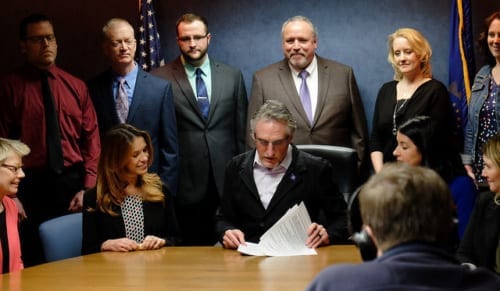Innovative state education plans to expand student learning options
By Anne Olson

Governor Doug Burgum at the signing ceremony for SB 2186 in the Governor’s Conference Room.
“This bill takes a crucial step in the right direction, empowering local school districts to better shape educational delivery to meet the needs of the 21st century,” North Dakota Governor Doug Burgum said as he signed SB 2186 into law. “We are excited to put control of education back where it belongs – in the hands of teachers, students and parents.” North Dakota joins a growing number of states that recognize the importance of thoughtful growth in personalized education, truly putting students at the center of learning. Other states have passed legislation that focuses on specific types of personalized learning environments, such as competency-based (or mastery-based) education.
Here are some states leading the way on competency-based learning from a policy perspective:
1.) Utah passed SB 143 into law last year, creating the Competency-Based Education Grants Program. This grant program allows local education agencies to apply for grant funding to pilot competency-based learning to improve educational outcomes in public schools. The grant program requirements are divided into three separate grant options: planning grants must come first, followed by implementation grants for schools that develop a successful plan and finally expansion grants are designated for those schools that successfully implement a mastery learning program.
2.) Illinois passed HB 5729 in 2016, which in part created a pilot program for competency-based education. Additionally, the state launched the Competency-Based High School Graduation Requirements Pilot Program for grades 9-12. This pilot launched in 12 districts throughout the state.
3.) In 2012, Idaho’s Task Force for Improving Education named mastery education as a key recommendation. By 2015, the state had passed HB 110, in which the Department of Education was required to conduct a statewide awareness campaign to promote the understanding of mastery education, establish a committee of educators to identify roadblocks and possible solutions to implementing mastery education and facilitate an incubator program of school districts to begin implementing mastery learning district-wide.
In addition to local legislative changes, states are outlining ways to advance personalized learning through the Every Student Succeeds Act (ESSA). ESSA provides states with significant flexibility to advance personalized learning to improve equitable outcomes for students, and it is increasingly obvious that states are ready to take advantage of those opportunities.
At KnowledgeWorks, we’ve been curating an interactive map of state ESSA plans that focuses on personalized learning. We’ve found that a vast majority of states will prioritize academic growth as a measure in their accountability systems under the new law as a way to ensure students are receiving the supports they need to become proficient in academic subjects. Some states, like Rhode Island, are using the flexibilities under ESSA to explicitly create statewide personalized learning initiatives, beginning with a pilot program.
 When a state creates opportunities for districts to personalize learning for their students, through pilot programs, innovation zones or through other allowances through their state education agency, they send a message to districts that they are committed to growing and sustaining this work over time. They are making a commitment to innovative learning. Such is the case in North Dakota.
When a state creates opportunities for districts to personalize learning for their students, through pilot programs, innovation zones or through other allowances through their state education agency, they send a message to districts that they are committed to growing and sustaining this work over time. They are making a commitment to innovative learning. Such is the case in North Dakota.
“We already have great education here for North Dakota kids, but we can do better,” said Senator Erin Oban, one of the bill’s sponsors. She added that the new law is going to help the state take a “big, important step forward in education.”
The Senate’s primary bill sponsor, Senator Nicole Poolman said, “By giving schools more flexibility today, we will create better outcomes and opportunities for students tomorrow.”
Author
Anne Olson serves as the Director of State Advocacy for KnowledgeWorks. She works in coalition with states to find opportunities to scale personalized learning through policy change. In this position, she facilitates dialogue between advocacy organizations, school districts, state education agencies, and legislators across the country.
She has a strong commitment to making learning relevant and beneficial for every student, and focuses much of her energy on creating a more equitable education system by understanding how learners engage with the world beyond academics. Prior to this position, Anne worked in corporate communications and as a non-profit lobbyist in Texas. She holds a Master’s of Social Work with a concentration in policy practice and administration from the University of Denver.
- EdTech Digest – The State of Personalized Learning
- The Atlantic – Will Personalized Learning Become the New Normal?
- Ed Scoop – Charlotte-Mecklenberg’s personalized learning chief highlights top edtech priorities


